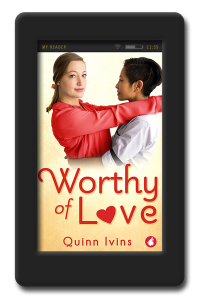Amazon Affiliate Link | Bookshop.org Affiliate Link
Of all the tropes in the world, the twin swap was not one that I would have thought myself a fan of, and yet… I might be now, after reading Something’s Different. Caitlin Taylor is an unemployed PhD grad who hasn’t been able to find a job in academia and reluctantly returns home to lick her wounds. Ironically, she finds herself in the heart of the academic world, working in a peripheral role as assistant to a college president— except the job isn’t really hers. She’s impersonating her sister. Chloe is Caitlin’s twin, a college drop out, historically a bit of an underachiever who follows her heart rather than her head. When she calls in a big favor from her sister, Chloe doesn’t think her boss will suspect a thing. But while they may look alike, the two sisters are polar opposites in their approaches to life, and what should have been just one week doing the bare minimum at Chloe’s job turns into a much more complicated situation for Caitlin.
First of all, let’s talk about the absolute second hand anxiety that you will experience reading this book. The book isn’t angsty, but wow does it keep you on the edge of your seat. WHAT IF SOMEONE FINDS OUT? Will Caitlin be fired? Arrested? How will she even know what to do and where to go?? On top of all of this, sympathetic Caitlin, who’s been suckered into this gig by her mom and sister, has an actual anxiety disorder and oh my gawd how is she even functioning? Caitilin’s issues with anxiety bring up a big theme in this book: mental health and the stigma attached to those issues. More on that in a minute.
For now, say hi to Ruth Holloway, ice queen extraordinaire and college president of a financially struggling institution. Ruth’s new assistant is suddenly competent. Helpful, even. And an analytic wunderkind? And hot? No, no, definitely not hot. Very inappropriate. While on the surface Ruth is successful and confident, she has her own struggles with mental health and a complicated relationship with the world of academia. She has some very valid trust issues that she navigates while serving as captain of a slowly sinking ship. With a bit of unexpected help from her (somehow now very helpful) assistant, Ruth realizes that despite their age gap, she and “Chloe” (Caitlin!) have a lot in common and work well as a team.
Both Caitlin and Ruth manage mental health issues in their lives with medication and have very open discussions about their experiences. I appreciate Ivins addressing the side effects of medications, including the sexual side effects; it’s refreshing to see authors chipping away at the stigmas around issues like these. (Ivins gave us this same positive treatment in her previous book, Worthy of Love, in which one of the main characters has undiagnosed ADHD.)
This book has great pacing, and while it deals with the politics of academia, it never gets bogged down with the details. Ivins creates great tension with the medium stakes risks of Caitlin getting caught, and there is a steady push and pull of chemistry between our main characters as they fight their attraction. Ivins dishes us up all the great tropes while giving us a fresh look at workplace politics from two very different points of view.


